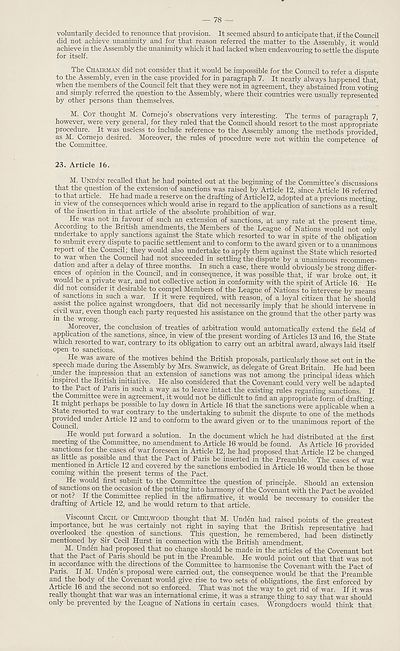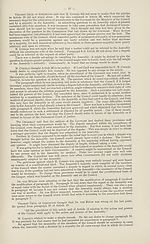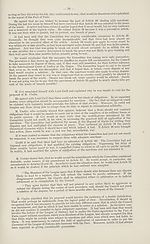Legal > Committee for the amendment of the Covenant of the League of Nations in order to bring it into harmony with the pact of Paris
(82)
Download files
Complete book:
Individual page:
Thumbnail gallery: Grid view | List view

— 78 —
voluntarily decided to renounce that provision. It seemed absurd to anticipate that, if the Council
did not achieve unanimity and for that reason referred the matter to the Assembly, it would
achieve in the Assembly the unanimity which it had lacked when endeavouring to settle the dispute
for itself.
The Chairman did not consider that it would be impossible for the Council to refer a dispute
to the Assembly, even in the case provided for in paragraph 7. It nearly always happened that
when the members of the Council felt that they were not in agreement, they abstained from voting
and simply referred the question to the Assembly, where their countries were usually represented
by other persons than themselves.
M. Cot thought M. Cornejo’s observations very interesting. The terms of paragraph 7
however, were very general, for they ruled that the Council should resort to the most appropriate
procedure. It was useless to include reference to the Assembly among the methods provided,
as M. Cornejo desired. Moreover, the rules of procedure were not within the competence of
the Committee.
23. Article 16.
M. UndAn recalled that he had pointed out at the beginning of the Committee’s discussions
that the question of the extension of sanctions was raised by Article 12, since Article 16 referred
to that article. He had made a reserve on the drafting of Articled, adopted at a previous meeting
m view of the consequences which would arise in regard to the application of sanctions as a result
of the insertion in that article of the absolute prohibition of war.
He was not in favour of such an extension of sanctions, at any rate at the present time
According to the British amendments, the Members of the Teague of Nations would not only
undertake to apply sanctions against the State which resorted to war in spite of the obligation
to submit every dispute to pacific settlement and to conform to the award given or to a unanimous
report of the Council; they would also undertake to apply them against the State which resorted
to war when the Council had not succeeded in settling the dispute by a unanimous recommen¬
dation and after a delay of three months. In such a case, there would obviously be strong differ¬
ences of opinion in the Council, and in consequence, it was possible that, if war broke out, it
would be a private war, and not collective action in conformity with the spirit of Article 16. He
did not consider it desirable to compel Members of the Teague of Nations to intervene by means
of sanctions m such a war. If it were required, with reason, of a loyal citizen that he should
assist the police against wrongdoers, that did not necessarily imply that he should intervene in
civil war, even though each party requested his assistance on the ground that the other party was
in the wrong.
Moreover, the conclusion of treaties of arbitration would automatically extend the field of
application of the sanctions, since, in view of the present wording of Articles 13 and 16, the State
which resorted to war, contrary to its obligation to carry out an arbitral award, always laid itself
open to sanctions.
He was aware of the motives behind the British proposals, particularly those set out in the
speech made during the Assembly by Mrs. Swanwick, as delegate of Great Britain. He had been
under the impression that an extension of sanctions was not among the principal ideas which
inspired the British initiative. He also considered that the Covenant could very well be adapted
^ Pact of Paris in such a way as to leave intact the existing rules regarding sanctions. If
the Committee were in agreement, it would not be difficult to find an appropriate form of drafting.
might perhaps be possible to lay down in Article 16 that the sanctions were applicable when a
btate resorted to war contrary to the undertaking to submit the dispute to one of the methods
provided under Article 12 and to conform to the award given or to the unanimous report of the
Council. ^
He would put forward a solution. In the document which he had distributed at the first
meeting of the Committee, no amendment to Article 16 would be found. As Article 16 provided
sanctions for the cases of war foreseen in Article 12, he had proposed that Article 12 be changed
as little as possible and that the Pact of Paris be inserted in the Preamble. The cases of war
mentioned m Article 12 and covered by the sanctions embodied in Article 16 would then be those
coming within the present terms of the Pact.
He would first submit to the Committee the question of principle. Should an extension
of sanctions on the occasion of the putting into harmony of the Covenant with the Pact be avoided
or not. If the Committee replied in the affirmative, it would be necessary to consider the
drafting of Article 12, and he would return to that article.
Viscount Cecit of Cheewood thought that M. Unden had raised points of the greatest
importance, but he was certainly. not right in saying that the British representative had
overlooked the question of sanctions. Phis question, he remembered, had been distinctly
mentioned by Sir Cecil Hurst in connection with the British amendment.
M. Unden had proposed that no change should be made in the articles of the Covenant but
that the Pact of Paris should be put in the Preamble. He would point out that that was not
m accordance with the directions of the Committee to harmonise the Covenant with the Pact of
Paris. If M. Unden’s proposal were carried out, the consequence would be that the Preamble
and the body of the Covenant would give rise to two sets of obligations, the first enforced by
Article 16 and the second not so enforced. That was not the way to get rid of war. If it was
really thought that war was an international crime, it was a strange thing to say that war should
only be prevented by the Teague of Nations in certain cases. Wrongdoers would think that
voluntarily decided to renounce that provision. It seemed absurd to anticipate that, if the Council
did not achieve unanimity and for that reason referred the matter to the Assembly, it would
achieve in the Assembly the unanimity which it had lacked when endeavouring to settle the dispute
for itself.
The Chairman did not consider that it would be impossible for the Council to refer a dispute
to the Assembly, even in the case provided for in paragraph 7. It nearly always happened that
when the members of the Council felt that they were not in agreement, they abstained from voting
and simply referred the question to the Assembly, where their countries were usually represented
by other persons than themselves.
M. Cot thought M. Cornejo’s observations very interesting. The terms of paragraph 7
however, were very general, for they ruled that the Council should resort to the most appropriate
procedure. It was useless to include reference to the Assembly among the methods provided,
as M. Cornejo desired. Moreover, the rules of procedure were not within the competence of
the Committee.
23. Article 16.
M. UndAn recalled that he had pointed out at the beginning of the Committee’s discussions
that the question of the extension of sanctions was raised by Article 12, since Article 16 referred
to that article. He had made a reserve on the drafting of Articled, adopted at a previous meeting
m view of the consequences which would arise in regard to the application of sanctions as a result
of the insertion in that article of the absolute prohibition of war.
He was not in favour of such an extension of sanctions, at any rate at the present time
According to the British amendments, the Members of the Teague of Nations would not only
undertake to apply sanctions against the State which resorted to war in spite of the obligation
to submit every dispute to pacific settlement and to conform to the award given or to a unanimous
report of the Council; they would also undertake to apply them against the State which resorted
to war when the Council had not succeeded in settling the dispute by a unanimous recommen¬
dation and after a delay of three months. In such a case, there would obviously be strong differ¬
ences of opinion in the Council, and in consequence, it was possible that, if war broke out, it
would be a private war, and not collective action in conformity with the spirit of Article 16. He
did not consider it desirable to compel Members of the Teague of Nations to intervene by means
of sanctions m such a war. If it were required, with reason, of a loyal citizen that he should
assist the police against wrongdoers, that did not necessarily imply that he should intervene in
civil war, even though each party requested his assistance on the ground that the other party was
in the wrong.
Moreover, the conclusion of treaties of arbitration would automatically extend the field of
application of the sanctions, since, in view of the present wording of Articles 13 and 16, the State
which resorted to war, contrary to its obligation to carry out an arbitral award, always laid itself
open to sanctions.
He was aware of the motives behind the British proposals, particularly those set out in the
speech made during the Assembly by Mrs. Swanwick, as delegate of Great Britain. He had been
under the impression that an extension of sanctions was not among the principal ideas which
inspired the British initiative. He also considered that the Covenant could very well be adapted
^ Pact of Paris in such a way as to leave intact the existing rules regarding sanctions. If
the Committee were in agreement, it would not be difficult to find an appropriate form of drafting.
might perhaps be possible to lay down in Article 16 that the sanctions were applicable when a
btate resorted to war contrary to the undertaking to submit the dispute to one of the methods
provided under Article 12 and to conform to the award given or to the unanimous report of the
Council. ^
He would put forward a solution. In the document which he had distributed at the first
meeting of the Committee, no amendment to Article 16 would be found. As Article 16 provided
sanctions for the cases of war foreseen in Article 12, he had proposed that Article 12 be changed
as little as possible and that the Pact of Paris be inserted in the Preamble. The cases of war
mentioned m Article 12 and covered by the sanctions embodied in Article 16 would then be those
coming within the present terms of the Pact.
He would first submit to the Committee the question of principle. Should an extension
of sanctions on the occasion of the putting into harmony of the Covenant with the Pact be avoided
or not. If the Committee replied in the affirmative, it would be necessary to consider the
drafting of Article 12, and he would return to that article.
Viscount Cecit of Cheewood thought that M. Unden had raised points of the greatest
importance, but he was certainly. not right in saying that the British representative had
overlooked the question of sanctions. Phis question, he remembered, had been distinctly
mentioned by Sir Cecil Hurst in connection with the British amendment.
M. Unden had proposed that no change should be made in the articles of the Covenant but
that the Pact of Paris should be put in the Preamble. He would point out that that was not
m accordance with the directions of the Committee to harmonise the Covenant with the Pact of
Paris. If M. Unden’s proposal were carried out, the consequence would be that the Preamble
and the body of the Covenant would give rise to two sets of obligations, the first enforced by
Article 16 and the second not so enforced. That was not the way to get rid of war. If it was
really thought that war was an international crime, it was a strange thing to say that war should
only be prevented by the Teague of Nations in certain cases. Wrongdoers would think that
Set display mode to:
![]() Universal Viewer |
Universal Viewer | ![]() Mirador |
Large image | Transcription
Mirador |
Large image | Transcription
Images and transcriptions on this page, including medium image downloads, may be used under the Creative Commons Attribution 4.0 International Licence unless otherwise stated. ![]()
| League of Nations > Legal > Committee for the amendment of the Covenant of the League of Nations in order to bring it into harmony with the pact of Paris > (82) |
|---|
| Permanent URL | https://digital.nls.uk/191509878 |
|---|
| Shelfmark | LN.V |
|---|
| Description | Over 1,200 documents from the non-political organs of the League of Nations that dealt with health, disarmament, economic and financial matters for the duration of the League (1919-1945). Also online are statistical bulletins, essential facts, and an overview of the League by the first Secretary General, Sir Eric Drummond. These items are part of the Official Publications collection at the National Library of Scotland. |
|---|---|
| Additional NLS resources: |
|

